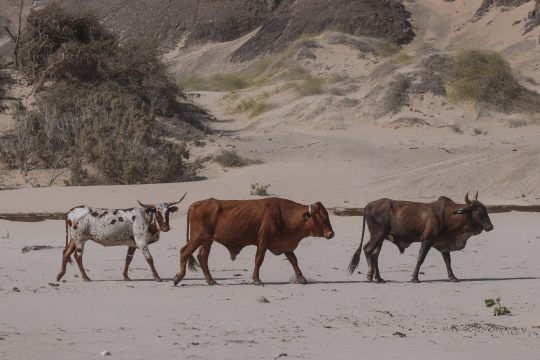Climate forecasting is essential for improved decision-making and risk mitigation in arid and semiarid regions where farm production is a dominant livelihood. However, the access and use of climate information are low. EfD researchers investigate the impact of climate information on adaptive capacity and food security in Namibia.
The Natural Capital Collaborative (NatCap), hosted by EfD South Africa, aims to mainstream ecosystem services in decision-making in the Global South by furthering the knowledge and understanding of valuing, accounting for, securing and enhancing these services. With the launch of the new sustainable agricultural thematic focus, led by Dr. Mintewab Bezabih, EfD Ethiopia, the collaborative aims to highlight past and future research which focuses on sustainable agricultural practices within the Global South. The access and use of climate information for informing agricultural practices have become a priority focus especially within our changing climate.
Climate-sensitive livelihoods, such as agriculture and livestock farming, are reliant on climate information to make informed livelihood decisions and manage climate-related risks. For example, information on rainfall or drought/flood risk can greatly improve decision-making and risk mitigation in agricultural regions of Namibia. However, even when this information exists, the access and use of climate information, especially for forecasting purposes, remain sparse.
To address the gap between generating climate information and using this information in decision making, EfD researchers Martine Visser, EfD South Africa, along with Zachary Gitonga, EfD South Africa, and Chalmers Mulwa, EfD Kenya, published research in 2020 on how climate information is accessed and used in North-Central Namibia.
Improve access to climate information
The study highlighted that only 45% of the 653 households interviewed during the project received climate information, with many of the households suggesting that the information received was mostly insufficient for decision-making on their farms. As a result, many households were reliant on traditional knowledge regarding climate-related decision-making, e.g. information on seasonal climate changes. This may be problematic in the future as the climate becomes more unpredictable with the effects of climate change. The study showed that there is great potential for climate information as a tool to increase awareness and response to climate change. However, it is currently underutilized.
“This research highlights the benefits of climate information in promoting the adaptation of climate-smart agricultural practices amongst smallholder farmers in arid areas, especially in the face of climate change. Ultimately this will improve their livelihoods,” explains Byela Tibesigwa a senior research fellow at EfD Tanzania, and one of the researchers working on a new paper related to the project, along with Martine Visser and Mintewab Bezabih, which will further explore the impact of climate information access and use.
Work with local leaders
The role of traditional knowledge and local information chains highlights the potential for policymakers and governments to work with local leaders to integrate climate information into local knowledge systems. The study indicated that when climate information was available many farmers used this information to mitigate climate risk. Leveraging already established local knowledge systems can enhance access and use of important climate forecasting information.
“Climate literacy is an important tool as it raises awareness in smallholder farming households on the harmful effects of climate change and what these farmers can do to adapt to the changing environment. We hope this research will create a dialogue in the policy arena on how best to enhance the livelihoods of smallholder farmers in arid areas,” states Byela Tibesigwa.
Read the full journal article here
By: Dr. Michelle Blanckenberg
